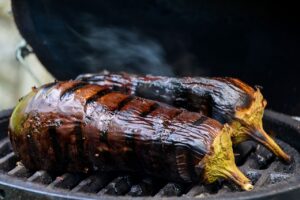A pellet grill is a type of smoker that uses pellets as fuel. Pellets are made from compressed sawdust, which burns at a consistent temperature and produces little ash or smoke.
They’re also easy to use and clean up, making them ideal for beginners who want to learn how to smoke meat without having to worry about things like lighting charcoal or maintaining an open flame.
Pellets are available in different flavors you can get hickory-smoked or mesquite-flavored pellets, for example and many manufacturers offer recipes for creating your own blends using different woods or spices.
If you want something more exotic than just beef jerky and chicken wings on your grill this winter, try smoking some salmon fillets with cherrywood chips!
How Pellet Grills Work
Pellet grills are a great option for those who want to cook with wood, but don’t have a lot of time or space to deal with the mess that comes with traditional grilling.
They’re also ideal for people who live in colder climates because they use electricity instead of propane or charcoal.
Pellet grills work by heating up pellets made from compressed sawdust, which releases heat when they burn.
The temperature is controlled by a digital thermostat that monitors the internal temperature of your grill and adjusts accordingly so you don’t have to worry about burning anything!
Advantages of Pellet Grills in Cold Weather
Pellets are easy to use. They’re a great option for those who want to grill but don’t want the hassle of charcoal or propane.
Pellet grills also offer temperature control, which is important if you’re trying to cook something specific like salmon or chicken breasts.
You can set the temperature at exactly what you need it at so that there’s no risk of burning your food.
Pellet grills are low maintenance compared with other types of grills because they don’t require any additional fuel other than pellets themselves (which are relatively inexpensive).
This means that there’s no messy cleanup after every use–just wipe down the inside with warm water and soap, then dry thoroughly before storing away until next time!
Disadvantages of Pellet Grills in Cold Weather
There are several disadvantages of pellet grills in cold weather. First, pellet grills can struggle to reach higher temperatures.
This is because the pellets themselves don’t burn as hot as other types of fuel and they must be heated up before being used in your grill.
In addition, it’s possible that your pellets may not even start burning at all if it gets too cold outside (or if there’s snow on top of them).
Secondly, pellet grills tend to take longer than other types of grills when starting up because they need time for their heating elements and burners to get hot enough so that they can begin cooking food effectively.
Finally, if you live somewhere where winters are harsh or there’s plenty of snowfall throughout the year then consider investing in additional insulation for both yourself and any outdoor appliances like this one!
Tips for Using Pellet Grills in Cold Weather
- Insulate the grill. If you’re going to be using your pellet grill in cold weather, it’s important to insulate it so that the heat generated by burning pellets doesn’t escape through cracks and crevices in the body of your grill. You can use blankets or other materials to do this; just make sure that whatever you choose doesn’t block air flow from getting into or out of your grill (air needs to circulate around hot surfaces).
- Use a starter cube. A good way to get things started when using a pellet grill in cold weather is by adding one or more starter cubes before starting up your fire–these are made specifically for this purpose and come with instructions on how much fuel should go into each one depending on what kind of temperature range you plan on cooking at (for example: 1 pound per hour at 0 degrees Fahrenheit). They’re also easy enough for anyone who isn’t familiar with starting fires with wood products like pellets!
- Preheat the grill before cooking begins so that everything comes out nice and hot once they’ve been placed inside; this will help prevent food from sticking onto grates while also helping maintain even temperatures throughout each item being cooked so nothing gets burned while waiting its turn under those flames.
Conclusion
As you can see, there are a lot of benefits to using a pellet grill in cold weather. However, there are also some disadvantages to consider.
The most obvious one is that you’ll need to make sure your pellets don’t freeze before they get used up. If this happens, it’s likely that your grill will stop working properly and could even break down completely!
Another thing worth noting is that pellet grills tend to be more expensive than other types of grills (like gas or charcoal), so if you’re on a budget but still want something high quality then this might not be for you.
Also remember that pellets themselves aren’t cheap either you’ll have to buy them regularly if you want good results from your grill!
